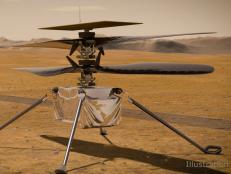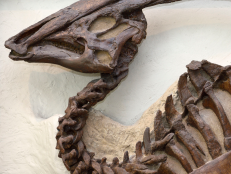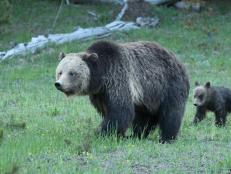Articles
Showing 1,951 - 1965 of 2,630 results
Species Loss is a Disaster for Wildlife and Humankind
Biodiversity and species loss is a grave threat, facing not only animals and plants but society too. Ecologists say that losing species directly affects human food production, water supply, building materials, and energy sources, so our interactions with and handling of ecosystems must be regulated.
Meet Ingenuity: NASA’s First Mars Helicopter
Perseverance with Ingenuity strapped to its belly launched on July 30, 2020, from Cape Canaveral Air Force Station in Florida. The Mars Rover and Mars Helicopter safely landed on the dusty surface at 3:55P ET on February 18, 2021, after traveling nearly 292.5 million miles.
Using What We Know to Predict the Next Pandemic
How can we predict another pandemic? Researchers are utilizing what we have learned from COVID-19 to get in front of the potential pandemics of the future.
Found: Perfectly Preserved Dinosaur Skull
Bucky gets lucky with a new fossil discovery. A North Carolina State University paleontologist finds his dream fossil in the sands of the New Mexico desert.
Celebrating Black Explorers with J.R. Harris
Meet J. Robert Harris, a marketing consultant and social scientist by profession and a true explorer by heart. He's been exploring remote parts of the world for 50 years. Using personal anecdotes and archival images, J.R. draws from his own expedition experience and spotlights the struggles and triumphs of Black explorers throughout history and those who forge ahead today.
Yellowstone’s Oldest Bear was a Whopping 34 Years Old
The oldest grizzly thought to have roamed the Yellowstone region was identified as being a whopping 34 years old, after biologists spotted a mark on his lip made in 1989.
Meet the First Cloned Endangered Animal in North America
This black-footed ferret is not only cute, she is beyond special. Meet Elizabeth Ann, the first endangered animal to be cloned in North America.
The 5 Greatest Robotic Space Explorers
Our little silicon friends have been exploring the harshest environments in the universe - space itself - in humanity’s name for decades. And while tales of their robotic exploits could fill an entire book, let’s count down the top five.
Snow Storms in Texas? Let’s Talk About It
Freezing temperatures in the south and warming temperatures in the north? Something isn’t adding up.
Mars is Getting International
Things are getting a little crowded at the red planet.
World of Bees: Science Creates a Buzz with First Global Species Map
Bees are the planet’s chief pollinators and possibly the most important species when it comes to plant and human survival. So the fact that they are becoming endangered due to climate change, pesticides and habitat loss should concern us all.
SoCal Town Earns Unique Whale Protection Title
A spot in Southern California has earned a unique status after being named the first ever Whale Heritage Site in the Americas, in a bid to protect the ocean’s largest creatures
'Ice Volcanoes’ Burst Along Lake Michigan
Past due! Lake Michigan’s winter wonders came a bit late this year. Do we blame climate change for this?
Countdown to the Mars Rover Landing
The Mars 2020 Perseverance Rover and Mars Helicopter, Ingenuity, are closer to Mars than ever before as touch down at the Jezero crater is scheduled for February 18, 2021. Let’s take a look back at its launch and learn how it will land on the Red Planet.
Are The Birds Getting Louder?
From the pages of The Explorers Journal, contributing editor Nick Smith gets to the bottom of a global pandemic phenomenon.






















